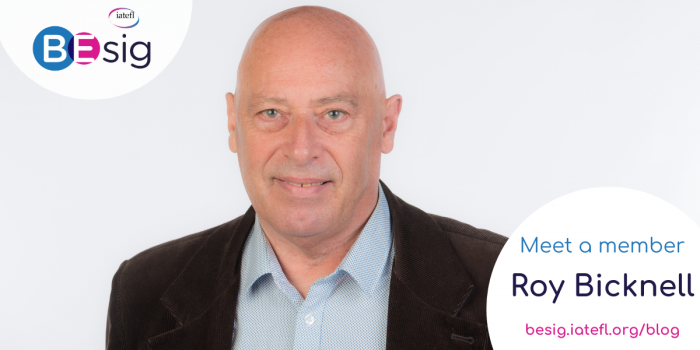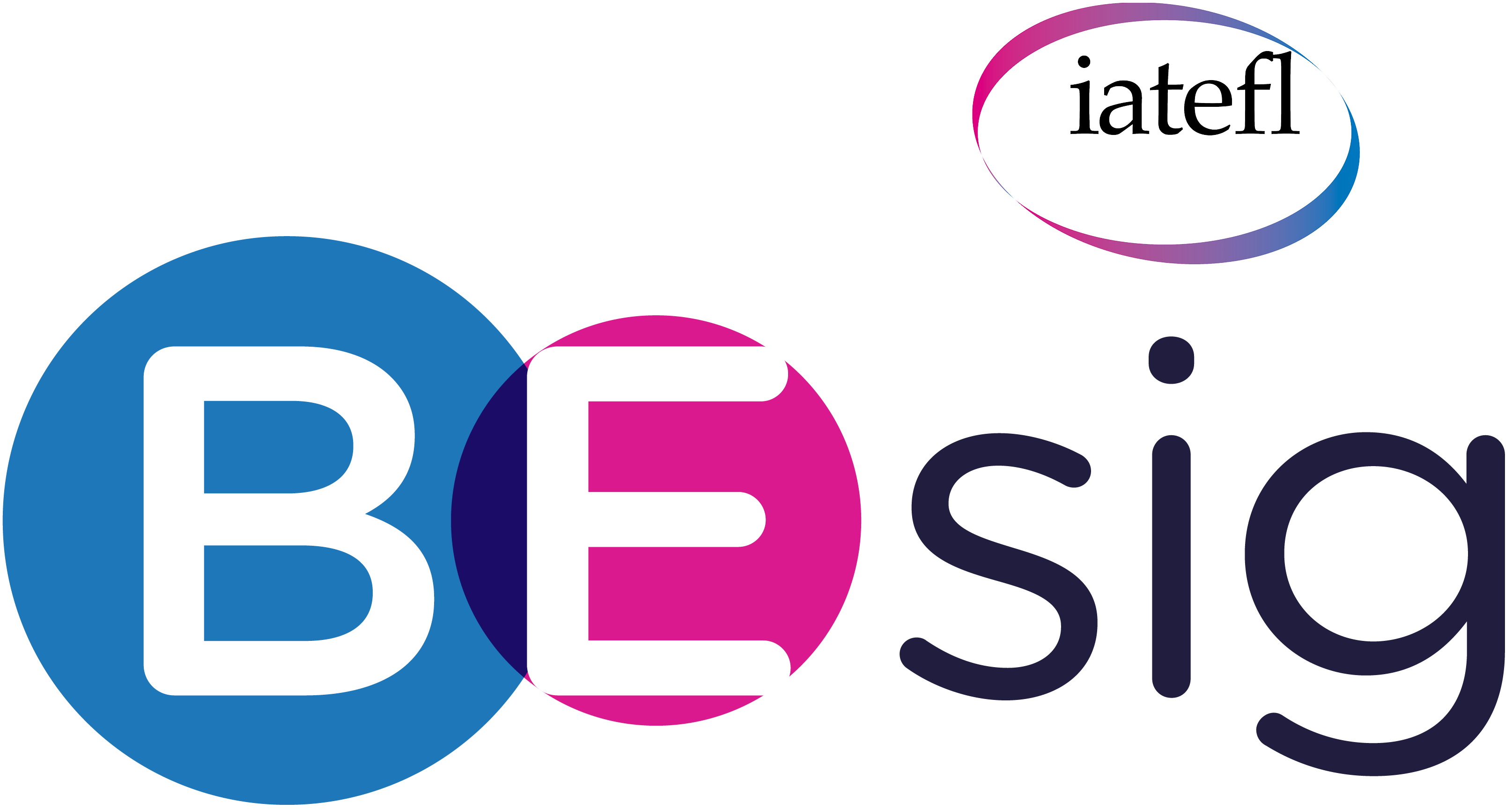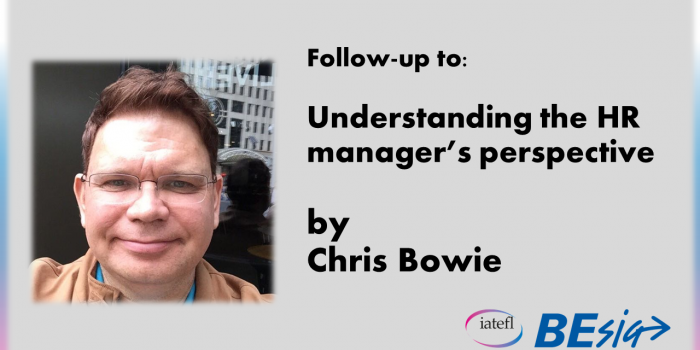
This week we have another IATEFL BESIG member who has given many years, sweat and tears to the organization. In this interview, Roy tells us about his experience volunteering, how he incorporates music into the classroom and he talks about his pride and joy: the Conference Selections.
Bio
Roy lives in Amsterdam, the Netherlands, where he works as an ELT trainer and teacher trainer with over 25 years of experience in the field of business English. Roy has been a member of IATEFL BESIG since 2006.
How did you begin your business English career and what do you do now?
I had not given teaching enough serious thought, so it wasn’t ‘planned’. In the mid-1990s, I was doing academic research when I got a call from a language school to see if I was interested in working with them. Finding myself at a crossroads I took the jump and accepted. It was a steep learning curve as I was a novice. One of the best things was that I was given the opportunity to experiment and try things out. Being allowed to make mistakes and learn from them was a game-changer. It opened new perspectives and this is one of the reasons I fell in love with teaching. Recently, I stopped working for my language school and went freelance for the first time. So, this is a year of transition as I set up new business projects which I hope will better utilize the experience I gained in recent years.
Having volunteered for IATEFL BESIG, what would you say are your top 3 highlights?
A good question, Mandy, but a hard one to answer as there were so many over the years. So, my top three is a random pick from the hat. My first full IATEFL BESIG event was the 2006 annual conference in Milan. I still remember the rush of adrenaline as I attended sessions and soaked up the heady atmosphere. I immediately had the sense of being welcomed into a thriving community. Then there were the early days of setting up the Conference Selections team in 2012 – I still remember our enthusiasm and excitement at the prospect of putting a digital publication series together. Another highlight was being part of the EVO team in 2013 and 2014. It was a good example of IATEFL BESIG professionals sharing their expertise with the broader professional community, especially outside Europe. We all learned so much from that.
What did you learn from volunteering for IATEFL BESIG and, in particular, working on the Conference Selections?
It deepened my sense of community with other volunteers but also with the IATEFL BESIG community at large. Perhaps the key insight was how important collaboration and teamwork in our work are, especially when making each new volume in the Conference Selections. I wouldn’t have thought beforehand we could learn so much from each other! In another respect, you’re also learning on the job. We gained insights and new (digital) skills as the team worked through the conference series. Two other things I learned: a better understanding of what makes the IATEFL BESIG community diverse and dynamic and I gained a clearer sense of why being professional matters.
Conference Selections
Available for members to download and read in the Members-only Area.
The Conference Selections will remain a part of IATEFL BESIG’s legacy for years to come. Why do you think this is important?
The Conference Selections is an important part of the legacy for a number of reasons. During the annual conferences, we reflect on our professional practice and the Conference Selections add another reflective dimension to that. Contributors have the opportunity to step back and take another look at what they presented. The best conference reports offer key insights into how the world of business English works and demonstrate its adaptability and flexibility. If you want to get a sense of how business English has shifted as it evolves into an interdisciplinary practice, then the Conference Selections with its eight volumes from 2012 to 2019 is a really good place to start! What’s more, there is a companion compilation Conference Collection which is also freely available to non-members on the IATEFL BESIG website. So, take a look and see what you’re missing!
What role does music play in your teaching?
I always felt that the classroom is an imagined space – the four walls can be ‘moved’. There is continuity between what goes on inside the classroom and outside. Music is a way of pulling down the walls so I sometimes use that to create a different classroom dynamic. It works, especially as most students are interested in music and ‘get’ the connection with the learning experience. Sometimes, I have done this by bringing a music instrument to the class (I play a couple of wind instruments). I’ve also done this at an IATEFL BESIG event, for example when Rob Howard (trumpet) and I (flute) played a duet in my Iasi workshop in 2018. But music is also an analogy. I developed some pairwork activities for mixed-ability classes on the basis of musical duets and I’ve written about how a lesson can change in speed just like a music composition.
How do you feel you have changed as a business English trainer during the Covid-19 pandemic?
That’s a tough one. The transition to online teaching was abrupt so I found myself having to think on my feet and come up with what sometimes felt like a stop-gap solution. But it did get me thinking and reflecting on what matters in teaching; in a way, the transition worked like a reset. One of the challenges was handling classroom interaction and feedback. The dynamic is so different online and there is not the immediacy of the F2F classroom. After some experimentation with different formats, I felt more comfortable and more aware of what works and what doesn’t work online. I learned how to manage student attention during activities and how to give more explicit feedback so that students felt engaged. So, in the end, I discovered that there are workarounds. Online teaching is different but still works.
How do you see conferences changing and developing in the future?
We’re in a period of transition as the Covid-19 pandemic is still having a big impact on how events are organised. So, much depends on how that develops over the next couple of years. I really enjoyed the new online annual conference last year, which I think was successful in recreating the intimacy and buzz that we have seen at the F2F annual conferences. But I do miss the immediacy of the F2F event too, with the hustle and bustle of delegates rushing to the next workshop and the impromptu gatherings of friends old and new. Perhaps the IATEFL BESIG community would benefit most from a hybrid format in which online and F2F conferences alternate? One thing I would like to see go on is the theme-driven concept of the annual conference. It really matches the diversity of our community.
What are your hopes and dreams for 2022?
This year has been one of transition as I set up new business projects, which I hope will reflect the shifts and changes in business communication in recent years. Think of, for example, the savviness of younger generation students when it comes to presenting while at the same time lacking confidence in other relevant business skills. It would be great to offer new programmes in 2022 which cater for that. I’m also thinking of offering teacher-training programmes which reflect what I’ve been speaking about at IATEFL BESIG in recent years – for example, improvisational skills and mixed-ability learning. I would also like to see the IATEFL BESIG community continue to thrive in 2022. It is such an important base for many of us. I felt I was joining something special in 2006 and that hasn’t changed. Our community has a bright future!
Questions by Mandy Welfare
Editing by Elizabeth Molt & Vicky Margari
23 September 2021



